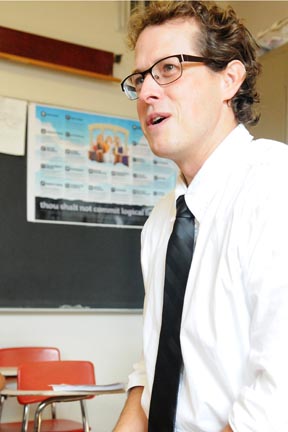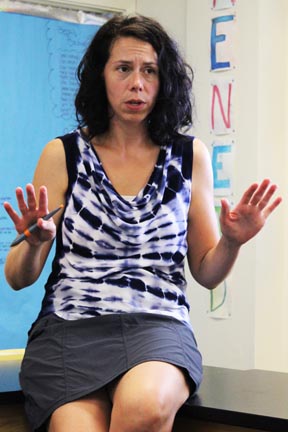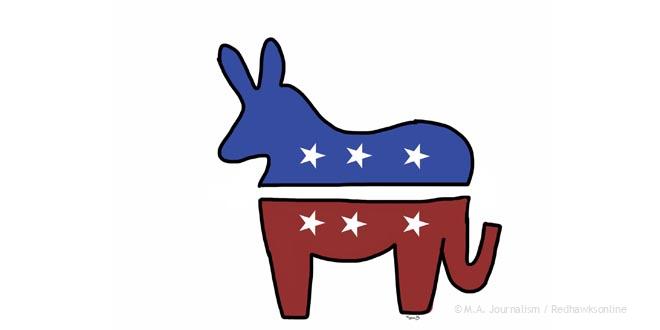The question of what exactly it means to be a conservative or liberal seems to be ignored by young voters who think that they already know everything. It’s easy to categorize people, but does being a conservative automatically make you a Republican? Can you be a Democrat with conservative views? What do the independent parties believe?
Generally speaking, the words Republican and Democratic represent the two major political parties. The words conservative and liberal represent viewpoints and attitudes towards issues, and they do not necessarily have to fit with their supposedly respective political parties. However, to most individuals, liberal is considered Democratic, and conservative is considered Republican.
“I caution my students to not necessarily label one party as the liberal party and one party as the conservative party,” said Matthew Ridenour, US government and AP US History teacher, “but to look case by case and issue by issue at what they believe.”
What does it actually mean to be a conservative? The word itself almost gives a clue, as the root of the word literally means, “to conserve.”
“What I teach in my class is that conservatism in America means that you prefer slow change over quick change,” Ridenour said. “Sometimes, conservatives are given a bad rap because it seems like they’re not progressive enough. It’s not that conservatives don’t care for change, it’s just that conservatism, as a principle, fundamentally means slow change that is thoughtful and considerate, not reactionary and not necessarily subject to fads and trends, rather tested over time.”
On the other hand, liberals prefer to make decisions that have to do with what is currently happening in society around them. The root of the word literally means, “to be free,” in other words, to be open to new decisions.
“To be liberal means to be open to fast paced, quick change of short periods of time,” Ridenour said. “When we talk about someone being a progressive liberal, what we mean is that they are looking at culture and trends and saying, ‘Well this is the direction society is heading, and therefore our party will follow.'”
Another perspective would be to look at how much of a role the government plays in daily life.
“A conservative is someone who is interested in building their own communities and institutions, and therefore wants less government interfering with them,” AP economics teacher David Hoffner said. “With smaller government and less intrusive governments, our communities can take care of themselves.”
Conservatives predominantly prefer more government involvement in social issues, such as restrictions on gay marriage, abortion and euthanasia, rather than economic issues. While conservatives would prefer a smaller, more regimented government (in certain situations), a liberal would prefer a larger government with more power in the state, especially in economic issues. With social issues, liberals prefer fewer restrictions by the government and more freedom for changing topics.
“Being liberal means that [your] highest priority is your individuality and your ability to express yourself,” Hoffner said, “because of that emphasis of focusing on the individual, there needs to be a larger state to protect you and your rights. So, you want a larger, active government that is going to be involved in protecting and producing for you, because you’re a sovereign individual.”
In a general sense, the majority of members of the United States are liberals in that free speech, freedom of religion and freedom of the press are all practiced.
Both Republicans and Democrats will agree with the idea of being liberal that way, but the main difference comes with the analysis of major issues.
For example, with abortion, liberals are typically “pro-choice”, where the woman has her individual, human right to choose what happens to her body – the government’s job is to protect this right.
Conservatives are usually “pro-life”, believing that the fetus has a human life since conception and abortion is something that should be restricted by the government, without taxpayer dollars supporting it.
With all the variations of meanings, how does that apply to the United States’ history and how has it influenced political parties to adjust?
“A lot of our current definitions were constructed out of the ’60s and ’70s,” said Nathan Johnson, who teaches AP US Government and Politics. “For example, liberalism today means to be involved in the economy with government intervention. That came out of FDR and the New Deal, which then became a part of the Democratic Party. Unions, African Americans and environmentalists tend to support the Democrats. Those two groups don’t automatically go together. Why would they all be in the same party? They don’t naturally fit there, it’s just a historical process.”
The point that Johnson makes is that meaning of the words change as context changes and specific situations influence parties. For example, African Americans used to be primarily a part of the Republican Party during Lincoln’s time as president.
The Republicans were the anti-slavery party while the Democrats were pro-slavery. This all changed in the 1930s when the Great Depression hit and meaning shifted with the parties.
New ideas came to light, new parties were sponsored by different organizations and things took a different turn.
It matters because the presidential campaign is heating up for the 2016 election.
“[Your vote] does make a difference,” senior Luke Frazier said. “I think people are really turned away from politics because it’s only one vote that’s not going to make a difference or affect anybody. One vote, but then you get more people involved, which becomes tens of thousands of votes.
Honestly, people need to take a look and see that this stuff affects our everyday lives. Why wouldn’t you want to make decisions on how your life would be affected?”
That’s one student’s perspective, but from all the “seasoned” voters, one consensus rang true: focus on issues that matter individually and reflect – know yourself and what you want.
 “I would make the winner the president and the second place the vice president. How fascinating would it be if it was Obama and Mitt Romney, and Mitt was there offering alternatives and asking questions. You don’t want people around you who are going to just affirm you all the time.” – economics teacher David Hoffner
“I would make the winner the president and the second place the vice president. How fascinating would it be if it was Obama and Mitt Romney, and Mitt was there offering alternatives and asking questions. You don’t want people around you who are going to just affirm you all the time.” – economics teacher David Hoffner
“You have conservÅ, conservÄre which means to conserve. You’re saving resources for future generations, however, you’re saving for yourself. Liberalis means free or generous. People are generous with providing for future generations. People could say that liberals are inconsistent and free with their thoughts.” – Latin teacher Johanna Beck

